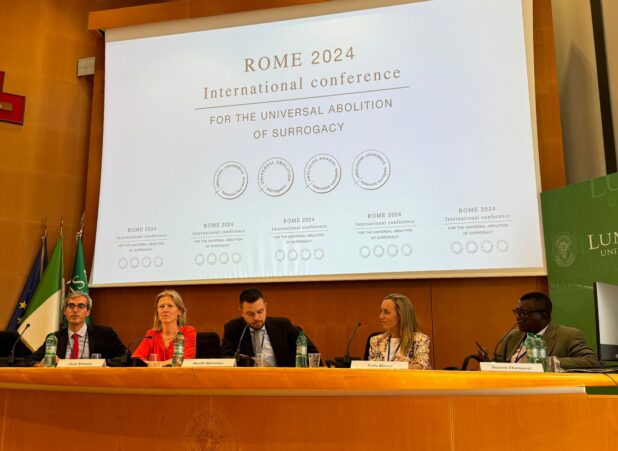
The Vatican has just released a new document on the topic of human dignity. Among other issues, it addresses the ethical problems of surrogacy—including the commodification of babies and the financial exploitation of low-income women who are contracted to be surrogates.
Ireland is in the process of adopting one of the most permissive laws in Europe on the issue, but elsewhere, opposition to the practice is mounting.
A major conference advocating for a worldwide ban on surrogacy was held in Rome last weekend. Experts at the conference argued that an international treaty is necessary to halt the practice. Although national bans have some impact, couples and single men may still travel to countries where surrogacy is legal or unregulated. This is why it is crucial for states to unite and establish a system to penalise corporations that serve as intermediaries between surrogate mothers and commissioning parents.
Some countries, such as Italy, are in the process of criminalising international surrogacy, punishing Italian citizens who engage in this practice abroad. Such an approach should be adopted by every country, the conference heard.
Banks and financial institutions play a pivotal role in the international surrogacy market, positioning them as critical targets in efforts to achieve worldwide abolition of this practice. At the conference, it was proposed that the responsibilities banks currently have in combating terrorism and money laundering should be expanded to include scrutiny of transactions related to surrogacy.
The meeting in Rome saw the participation of international experts and activists, including the Italian Minister for Family, a representative from the Holy See, various politicians, and notably, two United Nations officials. The UN Special Rapporteur on violence against women and girls, Reem Alsalem, and a member of the UN Committee on the Rights of the Child, Velina Todorova, attended as observers.
The politicians represented a broad spectrum of political affiliations, spanning right, centre, and left-wing parties. Similarly, the experts and activists brought a diverse range of ideological viewpoints to the discussion, including feminism, conservatism, and Christian Democracy, among others. This diversity underscored a rare consensus across political and ideological divides on the perils of surrogacy, a consensus that appears to be absent in Ireland.
This conference followed the launch of a declaration in Casablanca (Morocco) in March 2023, signed by 100 experts from 75 countries, calling for the universal abolition of surrogacy. The Casablanca Declaration initiative is led by Olivia Maurel, a French/US feminist activist conceived through surrogacy. The 32-year-old mother of three has faced mental health challenges from a young age, only later discovering the truth about her origins. She has since become one of the most vocal opponents of the “womb market.” At the conference, she gave a moving and powerful testimony about how surrogacy has affected her life, describing the commodification of children and women as a new form of slavery.
Before the conference, Olivia Maurel had a private audience with Pope Francis, who endorsed the conference’s goals. In January, the Pope had already called for “an effort by the international community to universally prohibit this practice,” a call reiterated in the new document on human dignity. Maurel is keen to stress that that she does not come at the issue from a religious perspective because she is an atheist.
The Rome conference continues the commitment of the Casablanca Declaration and aims to promote national and international initiatives, leading to the adoption of an international treaty among states.
At present, Ireland is far behind the curve on the matter, lost in the pretence that any ethical problems arising from the practice can easily be dealt with.
Nessun commento:
Posta un commento